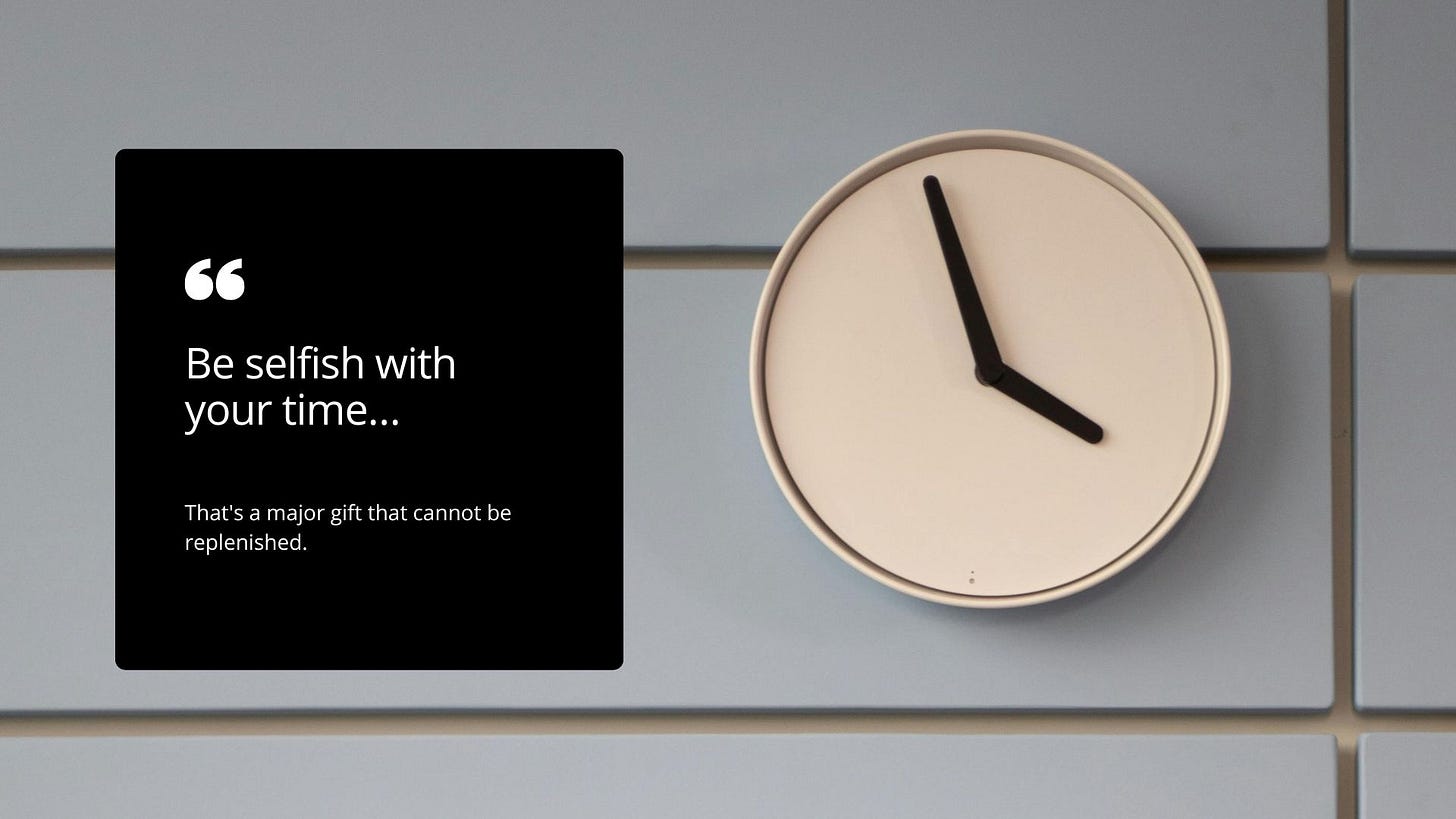“Be selfish with your time… That's a major gift that cannot be replenished.” T. James Ezenachi
In a world where we're constantly pulled in different directions, the concept of time management is more crucial than ever. We're often told to be generous with our time—whether it’s helping others, working overtime, or simply being available at a moment’s notice.
However, what if being generous with our time is actually costing us more than we realize? Time is a finite resource; once it’s gone, it’s gone forever. Unlike money, which can be earned back, or possessions, which can be replaced, time is irreplaceable.
In this post I will be explaining why it's not just okay but necessary to be selfish with your time.
The Irreplaceable Nature of Time
Time is the one resource that every person on this planet has in equal measure—24 hours a day.
Yet, how we use these hours differs vastly and can be the determining factor between a fulfilling life and one filled with regret.
Time is unique because it’s non-renewable. Once an hour, a day, or a year passes, it’s gone forever. You can’t buy more of it, you can’t store it for later, and you can’t turn back the clock. This makes time the most precious asset you have.
Consider this analogy: imagine you have a bank account with a set amount of money that you’re given at birth, and you can’t add to it or make more deposits. Every day, you withdraw from this account to live your life. When the account runs dry, your life is over. This is essentially how time works. Each day, you’re making a withdrawal, and once that time is spent, it’s gone for good.
Why Being "Selfish" with Your Time Is Not a Bad Thing
The term “selfish” often carries a negative connotation, suggesting that one is only concerned with their own interests at the expense of others.
However, when it comes to time, being selfish is not about neglecting others; it’s about protecting your most valuable resource. By being selective with how you spend your time, you’re prioritizing your well-being, goals, and happiness.
Being “selfish” with your time means understanding that your time is your own and that you have the right to choose how you spend it. It’s about recognizing that your time should be spent on activities, relationships, and pursuits that enrich your life, contribute to your growth, and bring you joy. It’s not about shutting others out; it’s about ensuring that you have enough time to take care of yourself so that you can be fully present and engaged in the moments that matter most.
Think of it this way: on an airplane, you’re instructed to put on your oxygen mask before helping others. The same principle applies to time. By ensuring your time is spent wisely, you’re better equipped to help and support others when it truly matters.
The Consequences of Wasting Time
When you fail to be mindful of how you spend your time, the consequences can be far-reaching. Wasting time on unimportant tasks or obligations that don’t serve your goals can lead to stress, burnout, and a lack of fulfillment. You may find yourself constantly busy but not truly productive, running from one task to the next without making meaningful progress.
Moreover, the pressure to always be available and to say “yes” to every request can erode your boundaries and leave you feeling overwhelmed. Over time, this can lead to resentment, strained relationships, and a sense of being out of control in your own life. The more you allow others to dictate how you spend your time, the less you’ll have to pursue your passions, achieve your goals, or simply enjoy life.
Practical Tips for Being More Selfish with Your Time
Here’s how you can start being more intentional about how you spend your time:
Set Clear Boundaries: Make it clear to others when you’re available and when you’re not. This might mean setting specific work hours, dedicating certain days to family, or simply scheduling regular “me time.”
Prioritize: Focus on tasks and activities that align with your personal and professional goals. Use tools like time-blocking to ensure you’re dedicating time to what truly matters.
Learn to Say “No” Without Guilt: Understand that saying “no” to one thing often means saying “yes” to something more important. Practice declining invitations or requests that don’t serve your priorities.
Reflect Regularly: Take time to assess how you’re spending your time. Are there activities that feel like a waste? Are you spending enough time on what brings you joy? Make adjustments as needed.
Invest in Self-Care: Remember that taking care of yourself isn’t selfish; it’s essential. Prioritize activities that recharge you, whether it’s exercise, reading, meditation, or simply relaxing.
With that being said, Time is your most valuable asset, and being selfish with it is not only acceptable but necessary.
Remember, once time is gone, it can never be replenished. So be mindful, be intentional, and most importantly, be selfish with your time.
Thank you for stopping by.
If you found any value in this post, I believe you will benefit from others too.
Would you like to add any personal anecdotes, specific examples, or additional insights to this post?
Please, leave them in the comments below.

Comments
Post a Comment